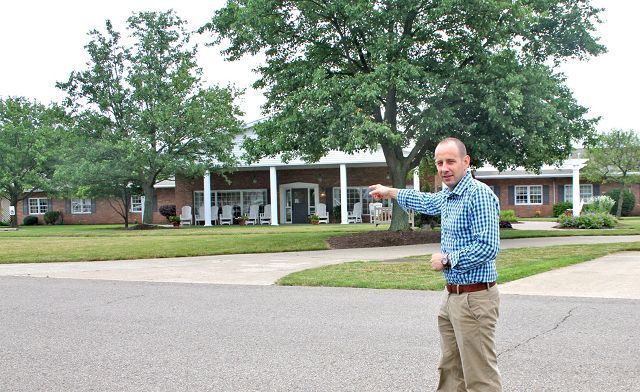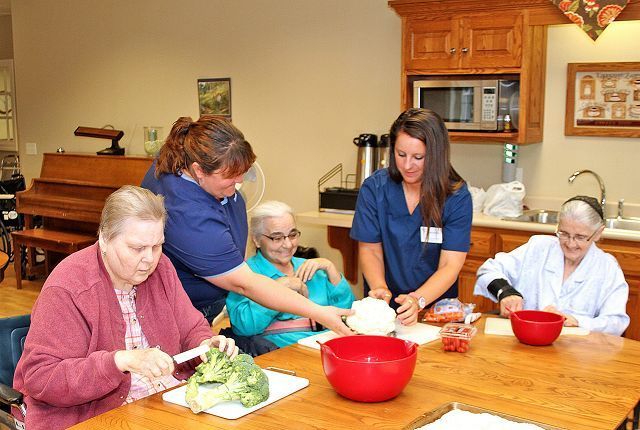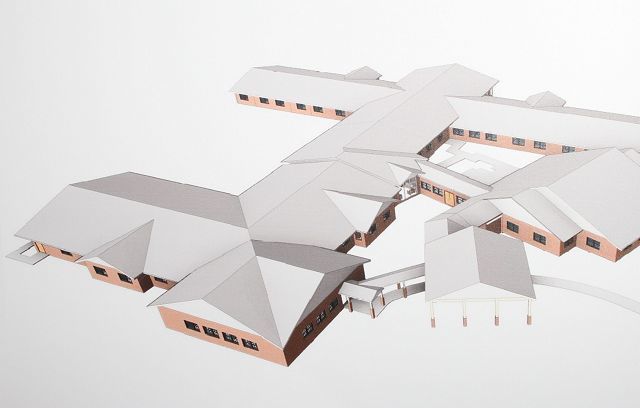State-of-the-art rehab facility coming to Walnut Hills Retirement Community
It is estimated that nearly 50 percent of community residents will need some type of short-term rehab in their future, whether it is therapy after a stroke, heart attack, knee replacement or other surgery. Now imagine that professional, top-notch quality care right here at homeat Walnut Hills Retirement Community. The days of leaving the area to receive rehabilitation services are over.
A new state-of-the-art building is on the horizon for Walnut Hills. A $3.5 million short-term rehabilitation expansion to the nursing home is under way. Walnut Hills Retirement Community, a nonprofit organization, is taking steps to make sure the project is debt-free and does not place additional costs on residents. In return, the professional, loving care associated with Walnut Hills for more than four decades is going to be extended further into the world of short-term rehab.
The expansion will allow patients more therapy opportunities to get them back home and living life again. Imagine golfing as part of your therapy, or grocery shopping, cooking and other activitiesWalnut Hills is stepping away from the traditional therapy ways and using creativity and compassionate care to get patients back home.
When you think short-term, you dont think of a nursing home. Walnut Hills Retirement Community is thinking short-termas in short-term rehabilitation.
A new state-of-the-art expansion is under way at the nursing home, as the Walnut Creek facility adds another footprint to its campus.
According to Jeremy Kauffman, Walnut Hills executive director, The short-term rehab program is growing and will continue to grow. There is always going to be a need for a nursing home to provide this kind of service, primarily because we can provide it cheaper than hospitals.
Short-term rehabilitation is defined as the time between a hospital stay and a patients return home. Speech, occupational or physical therapy, needed due to a knee replacement, stroke, heart attack or numerous other health issues, averages a 30-day stay. Outpatient rehab will also be available with the expansion eliminating the need to drive miles away for therapy. While Walnut Hills currently offers short-term rehab, the lack of space is restricting.
The expansion focuses on giving patients exactly what they want. The 17,000-square-foot addition will have 20 private rooms, complete with private bathrooms. The L-shaped expansion will connect to the nursing home and extend into the parking area and grassy area near the eastern hillside. The rehab gym is growing from a mere 300 square feet to 2,800 square feet.
Construction will take 12-14 months, with groundbreaking this September. Ivan Weaver Construction is the general contractor, and the new wing is slated to open Fall 2014.
Its not just about the building, revealed Kauffman, but how we care for the people. We know that better space, more equipment, and a larger environment will give us better results and allow us to be more effective.
Presently, a rehab patient may be sharing a room with an Alzheimers patient. Conversely, staff members have to tend to the needs of long-term and short-term patients. The expansion will be a place for all short-term patients, thus staff who work in that area will be more specialized.
The larger rehab facility will give Walnut Hills another edge by offering functional rehabilitation, which incorporates strength training rehab and other techniques into a patients daily activities. For instance, patients will not lift weights or walk between parallel bars all day. Instead, they will perform daily duties, such as laundry, cooking meals and other activities. A kitchen, laundry room and bathroom are part of the expansion. This allows patients to work with a therapist doing the things they will do at home. Oh, and dont be surprised if you see a therapist working with a patients golf swing!
We had a recent patient who had problems with balance and liked to golf. So the therapist went out to the yard and was practicing the patients golf swing while improving his balance and strength, Kauffman said smiling.
And this type of therapy even extends to nearby Walnut Creek Cheese. The therapist goes with the patient to Walnut Creek Cheese to shop for a meals ingredients, and they prepare a meal here. It helps the patient feel more comfortable with shopping and cooking when they return home, he explained.
Since Walnut Hills is a nonprofit, it is imperative the expansion does not put the organization in debt. And this is where you can help.
The $3.5 million project had a lead gift of $2 million. Walnut Hills saved $1 million, leaving $500,000 needed. To date, $91,000 has been raised.
Evidence of Walnut Hills community commitment added up to $1.1 million last year in benevolent care. From assistance with Medicaid, insurance differences and patient need, Walnut Hills stepped in to help.
We are a community organization; we are governed and operated by a local board of directors, Kauffman said. We strive to be good stewards by meeting the needs of the elderly, and if there are ways to meet the needs of others, we are going to do that.
If you would like to help with the expansion project, contact Jeremy Kauffman at 330-893-3200 or stop by for a visit at 4748 Olde Pump Street, Walnut Creek.
This article is underwritten by Walnut Hills Retirement Community.






